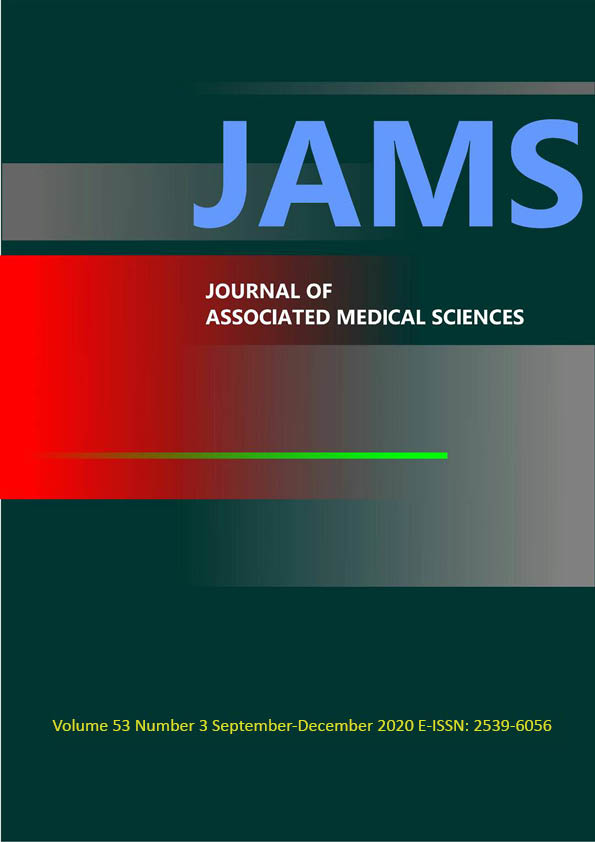Reliability and internal consistency of Thai activity card sort for stroke survivors in Occupational Therapy Units
Main Article Content
Abstract
Background: In Thailand, it is estimated that there are 250,000 new cases of stroke each year. About 50,000 patients lose their lives and around 30% of patients become paralyzed. Occupational Therapy (OT) has a key role in rehabilitation for stroke. In particular, it enables survivors to reengage in their occupations. The Activity Card Sort (ACS) is a useful tool for assisting clients to select therapeutic activities and occupations that are relevant to their needs and contexts.
Objectives: This study aims to create, test of reliability and internal consistency of Thai-ACS for stroke survivors in occupational therapy units.
Materials and methods: The development of the Thai-ACS for stroke rehabilitation was based on a survey of stroke survivors and occupational therapists (OTs) from OT clinics in 6 regions of Thailand. Cluster analyses were used to identify group and patterns of activities.
Results: The survey was completed by 120 clients and 60 OTs who then engaged with ACS in therapy. Thai-ACS was comprised of 100 activity items obtained from OTs and stroke survivors’ input. Three clusters emerged for domain areas, consisting of Basic rehabilitation skills and ADL (18 items); IADL, household and education (60 items); and Leisure and socio-cultural participation (22 items). All activities were created by the need of stroke survivors and related to their occupations. This final Thai-ACS also showed a Cronbach alpha coefficient of 0.832, which reflected high reliability and inter-correlations among test activity items.
Conclusion: Thai-ACS for stroke clients is a comprehensive instrument to engage collaboratively with stroke survivors in activities based on their cultural lifestyle. It will facilitate rigorous clinical and population-based research and will direct appropriate therapeutic engagement relevant to the client’s needs and contexts.
Article Details

This work is licensed under a Creative Commons Attribution-NonCommercial-NoDerivatives 4.0 International License.
Personal views expressed by the contributors in their articles are not necessarily those of the Journal of Associated Medical Sciences, Faculty of Associated Medical Sciences, Chiang Mai University.
References
McKenna K, Liddle J, Brown A, Lee K, Gustafsson L. Comparison of time use, role participation and life satisfaction of older people after stroke with a sample without stroke. Australian occupational therapy journal. 2009; 56(3): 177-88.
Suwanwela NC. Stroke epidemiology in Thailand. Journal of stroke. 2014; 16(1): 1.
American Occupational Therapy Association. The reference manual of the official documents of the American Occupational Therapy Association, Inc. Bethesda, MD: American Occupational Therapy Association; 2006. p. volumes.
Kielhofner G. A model of human occupation: Theory and application: Lippincott Williams & Wilkins; 2002.
Malkawi SH, Hamed RT, Abu-Dahab SM, AlHeresh RA, Holm MB. Development of the Arabic Version of the Preschool Activity Card Sort (A-PACS). Child Care Health Dev. 2015; 41(4): 559-68.
Gustafsson L, de Jonge D, Lai Y, Muuse J, Naude N, Hoyle M. Development of an Activity Card Sort for Australian adults aged 18-64 years. Aust Occup Ther J. 2014; 61(6): 403-14.
Baum CM, Edwards D, American Occupational Therapy Association. ACS : activity card sort. 2nd ed. Bethesda, Md.: AOTA Press, American Occupational Therapy Association; 2008. vii, 23 p. p.
Velde BP. A Review of:“Occupational Therapy: Performance, Participation, and Well-being (2005)” Edited by Charles H. Christiansen, Carolyn Baum, Contributing Editor Julie Bass-Haugen, 647 pp., Slack Inc, 6900 Grove Road, Thorofare, NJ 08086, 856-848-1000, Cost: $77.95. Taylor & Francis; 2009.
Laver-Fawcett AJ, Mallinson SH. Development of the activity card sort—United Kingdom version (ACS-UK). OTJR: Occupation, Participation and Health. 2013; 33(3): 134-45.
Hamed R, AlHeresh R, Dahab SA, Collins B, Fryer J, Holm MB. Development of the Arab heritage activity card sort. International Journal of Rehabilitation Research. 2011; 34(4): 299-306.
Packer TL, Boshoff K, DeJonge D. Development of the activity card sort--Australia. Aust Occup Ther J. 2008; 55(3): 199-206.
Laver-Fawcett AJ, Mallinson SH. Development of the Activity Card Sort-United Kingdom Version (ACS-UK). OTJR (Thorofare N J). 2013; 33(3): 134-45.
Linstone HA, Turoff M. The Delphi method : techniques and applications. Reading, Mass.: Addison-Wesley Pub. Co., Advanced Book Program; 1975. xx, 620 p. p.
Romesburg HC, Marshall K. Users manual for CLUSTAR/CLUSTID computer programs for hierarchical cluster analysis. Belmont, Calif.: Lifetime Learning Publications; 1984. v, 89 p. p.
Santos JRA. Cronbach’s alpha: A tool for assessing the reliability of scales. Journal of extension. 1999; 37(2): 1-5.
Katz N, Karpin H, Lak A, Furman T, Hartman-Maeir A. Participation in occupational performance: Reliability and validity of the Activity Card Sort. OTJR: Occupation, Participation and Health. 2003; 23(1): 10-7.
Fisher WP, Jr. Physical disability construct convergence across instruments: towards a universal metric. J Outcome Meas. 1997; 1(2): 87-113.
Christiansen C, Abreu B, Ottenbacher K, Huffman K, Masel B, Culpepper R. Task performance in virtual environments used for cognitive rehabilitation after traumatic brain injury. Arch Phys Med Rehabil. 1998; 79(8): 888-92.
Wottrich AW, von Koch L, Tham K. The meaning of rehabilitation in the home environment after acute stroke from the perspective of a multiprofessional team. Phys Ther. 2007; 87(6): 778-88.
Guidetti S, Tham K. Therapeutic strategies used by occupational therapists in self-care training: a qualitative study. Occup Ther Int. 2002; 9(4): 257-76.
Kielhofner G. Conceptual foundations of occupational therapy practice: FA Davis; 2009.
Legg L, Drummond A, Langhorne P. Occupational therapy for patients with problems in activities of daily living after stroke. Cochrane Database of Systematic Reviews. 2006(4).
Salter K, Jutai J, Teasell R, Foley N, Bitensky J, Bayley M. Issues for selection of outcome measures in stroke rehabilitation: ICF activity. Disability and rehabilitation. 2005; 27(6): 315-40.


